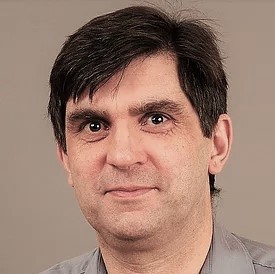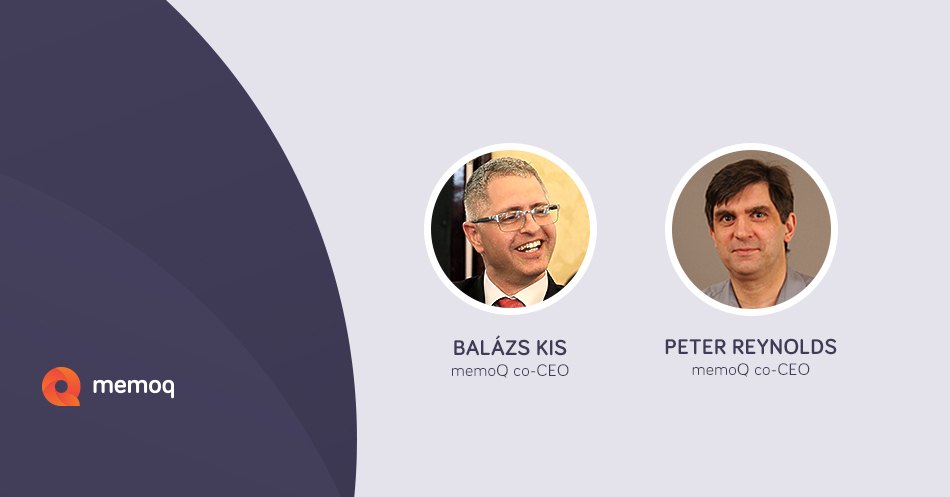Did you know that memoQ now has two CEOs? Shortly after we (Balazs Kis and Peter Reynolds) took over as co-CEOs of memoQ, we found that the co-CEO arrangement had certain extra benefits. It also came with built-in, unavoidable checks and balances that are sometimes lacking when there’s a solo CEO.
We have found that we’re making more informed decisions and, because we share the workload, this happens faster. We both are domain experts with many years of experience in the translation technology sector and each of us knows well what the other brings to the table. Interestingly, we also heard that memoQ was not the only company moving to a co-CEO arrangement—a few weeks after we adopted it, Netflix appointed co-CEOs, too.
But enough about us—we would rather share some of the ideas we have to help memoQ grow in value to you.
memoQ is in business to make translation professionals more productive. These professionals include project and other managers and translators. Our customers are smart, experienced, and competent translation professionals. They know how to manage highly complex translation processes. They know how to translate texts in which the slightest of errors is unacceptable or even tragic. And they seek to continually improve their productivity.
memoQ is about creating value for these customers.
Many of our competitors seek to grow by relying heavily on attracting investment. The problem with this approach is that it requires their focus to be on creating shareholder value. memoQ has long had a people-centered approach to growth. By attracting some of the most talented people around and giving them an opportunity to learn and realize their ambition, we have put memoQ on a course for substantial and sustained growth—growth that creates value for the customer.
There are several factors involved in creating value for our customers. Like all software, there are sometimes bugs in memoQ. However, we continuously and specifically work to make memoQ more stable and less buggy than the products of our competitors, and to be the gold-standard for user security in the industry. We plan to keep this up.
Any complex software product that has been in development for a reasonable amount of time will need optimization along the way: correcting code; streamlining integrations for parts of the software developed at different stages; and taking advantage of new technologies and methodologies to benefit the software. This accumulation of issues is known as technical debt and is a normal effect of long-term software development.
Most of the major TMS systems and CAT tools like memoQ have been in development for 10 years or more and have built up substantial technical debt to be dealt with. At memoQ, we consciously work to reduce the technical debt in the code so that we can continue to improve the long-term stability and reliability of our software.
From almost Day One, memoQ was obsessed with making sure any support query was answered quickly and effectively. We made a point of answering urgent support queries every day of the week. We were the first company in the industry to make support available 24 hours a day on working days, and today we have one of the largest, best trained, and most responsive teams of support engineers. We believe it is crucial that we are there when you have a problem if we want to create customer value, which we do.
memoQ can only make a translation professional more productive if that person knows about our solution and knows how to use it. We recognize that we need to improve our visibility and will be focusing on that in the months ahead. We also need our customers in enterprises and translation companies to know that memoQ is a mature translation management system and will boost the customer education available to them.
One of the ways memoQ makes translation professionals more productive is by offering greater leverage of the resources they use. Here are a few examples that demonstrate this:
- We believe memoQ offers the widest range of functionality for translation re-use and machine translation available in any translation tool.
- We have 20 different MT engines integrated within memoQ—and an MT SDK that allows for integration of any other engine, even without our intervention.
- memoQ was the first tool to introduce automatic subsegment leveraging.
- memoQ’s MatchPatch uses terminology to improve a fuzzy match or translation suggestion.
- memoQ is the only tool that has both segment- and corpus-based translation memory.
- And if you think that translation memory has been developed as far as it can go, think again. We’re at work on yet another memoQ innovation, with release targeted for early 2022.
- Quality management tools are not one size fits all. In addition to its wide array of customizable quality checks for machine-detectable errors, memoQ has an extensive set of customizable linquistic quality assessment (LQA) models. You can even create and use your own LQA models. Like all memoQ resources, these LQA models can be shared with other memoQ customers.
- When memoQ introduced project templates, we aimed to reduce project-related chores that fall to project managers. Our goal was to decrease the manual work needed to create a project in memoQ by 80%. The feedback we got from customers who use project templates was that they indeed saw increased productivity—Once a project template is created, it only takes a few minutes for the project manager to create a project from the template, even projects with sophisticated workflows.
One of the things that makes it fun to compete in the translation technology sector is that there are a lot of highly competent people working in it—not just for memoQ, but also for our competitors. We are delighted to offer strong competition. memoQ will deliver increased value for our customers in 2021 and hope our competitors also raise their game. The ultimate winner is the customer.

Peter Reynolds
memoQ co-CEO







